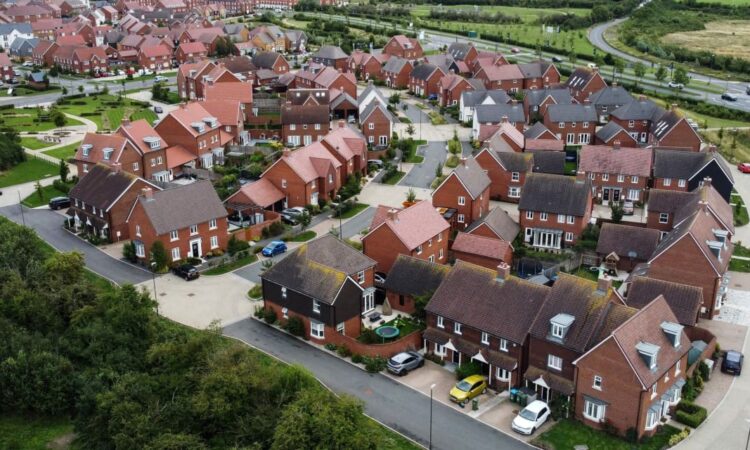
Britain’s biggest homebuilder Barratt Developments agreed on Wednesday to purchase rival Redrow for £2.52 billion ($3.18 billion) as signs emerged of a recovery in the U.K. housing market.
Adding Redrow’s high-end homes to Barratt’s portfolio would give “customers a wider range of home types and price points,” while also delivering cost synergies of up to £90 million from “procurement savings and a rationalization of divisional and central functions,” said the FTSE 100 member.
The merged group will be called Barratt Redrow, with Barratt’s shareholders holding about 67.2% of the group and Redrow’s shareholders the rest, and is expected to build about 22,000 properties a year creating revenues of about £7.5 billion.
Shares in Barratt
BDEV
fell 9% and those of Redrow
RDW
rose about 13% as analysts noted Barratt’s results released at the same time illustrated the difficulties facing the sector, with pre-tax profit dropping 81% in the second half of 2023.
Higher U.K. interest rates to force down inflation have raised mortgage costs for potential homeowners and shrunk demand for new homes, while rising material and labor costs have also scrunched margins.
“When an industry faces a difficult time consolidation is often the result and the proposed takeover of Redrow by Barratt Developments is evidence of that,” said Russ Mould, investment director at AJ Bell.
“Alongside news of the all-share deal, both businesses revealed a major downturn in trading which lays bare just how significant the impact of lower mortgage availability, rising costs and falling house prices have been,” Mould added.
However, Barratt also said Wednesday that it was starting to see signs of improvement in reservation rates and buyer sentiment, and this dovetailed with the latest market survey from mortgage lender Halifax, which found the average house price in the U.K rose 1.3% between December and January, a fourth consecutive month of gains.
“[T]here are hopes that the industry is now turning a corner…with a shortage of homes in great swathes of the UK being pushed up politicians’ priority lists, there is considerable long-term opportunity for a beefed up housebuilder,” said Susannah Streeter, head of money and markets at Hargreaves Lansdown.
The sharp fall in Barratt’s shares was weighing on the FTSE 100
UK:UKX
around lunchtime on Wednesday in London, with the U.K. blue-chip index down 0.5%. In Frankfurt the DAX
DX:DAX
fell 0.4% and the CAC 40
FR:PX1
in Paris dipped 0.2%, the latter supported by strength in the stocks of luxury goods groups.
Green energy producers were in the news. Shares of Denmark-listed Vestas Wind Systems
jumped more than 6% after the wind turbine maker beat market expectations as it swung to a full-year pretax profit, boosted by its highest-ever quarterly order intake, and said it sees higher revenue in 2024.
Meanwhile, shares of Ørsted
ORSTED
,
which are also listed in Denmark, fell 1% after the world’s biggest offshore windfarm developer said it would pause dividends, exit some markets and cut jobs as part of a restructuring.
“Before today, Ørsted was forced to cancel development of its major offshore wind projects in New Jersey and went on to announce asset write downs of over $5 billion.” noted Louis Knight, analyst at Third Bridge.
“The firm simply could not afford to fund the ambitious target of installing 50 gigawatts of renewable capacity by the end of the decade. Ørsted’s decision to cut dividends, sell assets and reduce costs is a reflection of the industry’s spiraling costs, supply shocks and unfavorable rate environment,” Knight added.
